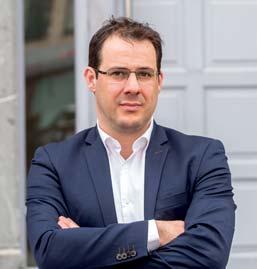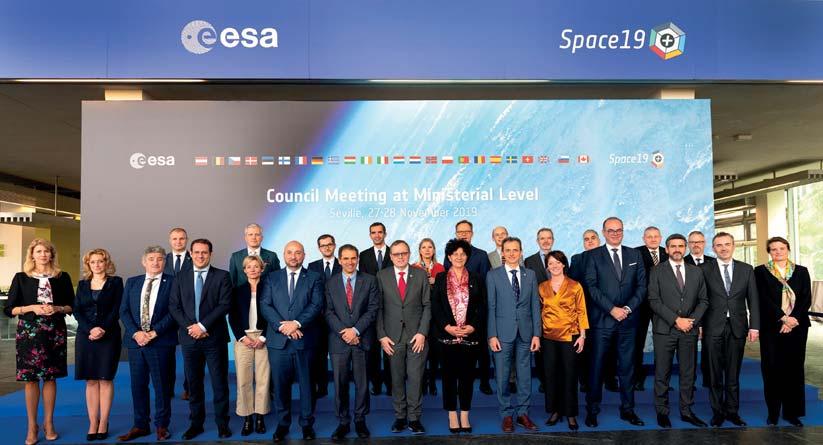
7 minute read
13
by 5rXobdlLrFp
Belgium boosts its R&D co-financing support for space companies
© Nathalie Bidoul
Advertisement
Interview with Mr David CLARINVAL, Vice-Prime Minister and Federal Minister of the Budget and Civil Service, in charge of the National Lottery and Science Policy
Could you tell us what major federal research programmes are currently supported by the government? At the federal authority level, several major research programmes are being conducted. Examples include the Brain-Be (Belgian Research Actions through interdisciplinary Networks) programme, which is entering its second phase (Brain-Be 2.0). Through research projects based on scientific excellence and rooted in European and international engagement, it makes it possible to meet the knowledge needs of the federal departments and to support the scientific potential of the Federal Scientific Establishments (FSE). Open to the entire Belgian scientific community (universities, colleges, public scientific establishments, non-profit research centres), it focuses on three pillars: challenges and knowledge of the living and non-living world; heritage science; federal societal challenges. For the period 2018-2023, the government has earmarked a budget of around 88 million euros for this programme.
The federal authority also supports other programmes such as FED-tWin, which aims at establishing sustainable research collaboration between the FSEs and the universities. Over the period 2017-2023, more than 125 postdoctoral researchers will be funded and work part-time at an FSE and part-time at a university. The recruitment of 25 researchers is now ongoing.
The Digit-04 programme is aimed at the digitisation of the scientific and cultural heritage of the FSEs and the Royal Belgian Film Archive. This transversal programme comprises two major parts: the actual digitisation, including the enhancement of the metadata, and the long-term preservation of the digital content on a common infrastructure. The programme (2019-2025) has been allocated a budget of around 39 million euros for the digitisation work.
The STERERO III programme aims to develop the scientific expertise of universities and research laboratories in the field of Earth observation by strengthening the incorporation of Belgian Earth observation activities into the programmes and actions developed at European and global level.
The Belgian Biodiversity Platform is the information and communication hub on biodiversity science and research in Belgium. It provides privileged access to primary biodiversity data and biodiversity research information. It encourages interdisciplinary cooperation among scientists and serves as an interface between researchers and science policy.
The federal authority also finances major national research infrastructures such as as the Queen Elisabeth Station, the Belgian Co-ordinated Collections of Micro-organisms (BCCM), BELGICA, and the MYRRHA project.
Could you tell us about the European and international research programmes in which the government participates? As part of the various institutional reforms, an important part of research-related competencies has been transferred to the Communities and the Regions. The federal level manages the research competencies required to exercise its own competencies, the organisation of data exchange networks between scientific establishments, space research in an international framework, and the FSEs, including their research and public service activities.
At European level, the federal authority participates in the EU’s Research & Innovation (R&I) framework programme. Our federal stakeholders mainly participate in the Marie Skłodowska-Curie Actions and in space, security, research infrastructures, and Euratom. In this respect, it is worth noting that when on October 11th the European Research Council (ERC) announced the award of new grants to European researchers, the list included the name of Dr Véronique Dehant, researcher at the Royal Observatory of Belgium, for the project GRAFECUL (Gravimetry, mAgnetism and CorE Flow). This was the second ESA grant to be awarded to Dr Dehant.
Belgium s also a founding member of ESO (European Space Observatory, since 1962), EMBL (European Molecular Biology Laboratory, since 1989) and ILL (Institut Laue-Langevin, since 2006).
Through the payment of annual contributions to international organisations and research infrastructures, the federal authority also ensure that the entire national scientific potential has access to the equipment, services and data of most of these organisations and infrastructures.
In addition, within the framework of the roadmap of the European Strategy Forum for Research Infrastructures (ESFRI), the Federal Science Policy Office supports the MYRRHA project and the upgrading of the ESF Research Infrastructures.
As concerns the ESFRI roadmap, the ESFs are actively involved in 10 of these distributed research infrastructures, including CESSDA (Council of European Social Science Data Archives) with the announced creation, in Belgium, of a social science research data archiving structure, and LIFEWATCH, a scientific and technological infrastructure for research on biodiversity and ecosystems. Lastly, the federal authority is a member of the European Space Agency (ESA).
What actions do you undertake to support innovation and technology research as part of Belgium’s participation in the European Space Agency? The very essence of ESA, across its mandatory programme or certain optional programmes such as Earth observation, GSTP or PRODEX, is to promote innovation and technology research. Belgium, which has been a member of ESA since its inception, is the 6th largest contributor behind countries such as France or Germany. This support directly benefits our businesses and our researchers because the Agency applies the fair return principle: every euro that is invested returns in the form of contracts to the Member State. This allows us to finance the R&D of companies our businesses, for example through the GSTP programme. Belgium’s contribution to ESA has been highly beneficial for the ESF research teams, in particular the Royal Belgian Institute for Space Aeronomy, which was able to achieve world-leading status thanks to this support.
Following the Agency’s ministerial conference in Seville on 27 and 28 November 2019, Belgium’s contributions to the Agency’s programmes over the period 2020-2024 have increased significantly. This will allow Belgium to consolidate its position in the European Space landscape. This support will also enable our country to participate in several of the Agency’s new major programmes, notably the development of 6 new Sentinel missions under the EU’s Copernicus programme for Earth observation, the development of an unmanned Earth-orbiting spacecraft allowing for re-entry into the atmosphere (Space Rider), the collaboration with NASA for the development of the Moon-orbiting station (Deep Space Gateway), the collaboration with NASA for the mission aimed at returning samples from the surface of Mars to Earth (Mars Sample Return), the mission aimed at analysing an asteroid in detail in order to work on solutions for avoiding collisions with Earth (HERA), etc. These missions will be using different Belgian technologies such as sophisticated measuring instruments (hyper-spectral, infrared...), key structural elements (system for coupling modules in space, cylinders...) and embedded software.
Belgium was also actively involved in the Ministerial Conference in Seville to maintain and above all consolidate the Agency’s ESEC (European Space Security and Education Centre) in Belgium (with sites in Redu and Transinne) in the field of cybersecurity for and by Space as the new strategic line.
Belgium’s contribution to ESA will also enable the finalisation and launch of the Earth observation mission ALTIUS, under Belgian leadership, aimed, among other things, at ozone monitoring; the extension of the operational phase of the Belgian PROBA-V mission for observation of the Earth’s vegetation. the technological consolidation of the new Ariane 6 and Vega C launchers to make them more attractive in an increasingly competitive market; an important contribution by Belgian players to the use of the international space station at industrial and scientific level; and the consolidation of Belgium’s capacity in the area of space meteorology to maintain its leading role in Europe.
Lastly, Belgium is strengthening its co-financing support for the R&D of space companies to make them more competitive on European markets and international markets in full expansion. Programmes in this context include ARTES (telecoms); NAVISP (navigation building on expertise from the Galileo programme); InCubed (Earth observation with the intention of positioning Belgian players in the context of small satellite constellations); GSTP (other technologies aimed at developing strong expertise and leadership of the Belgian industry at European level in the specific niche of cybersecurity for and by Space, in conjunction with the Agency’s ESEC centre in Belgium), and PRODEX (support to Belgian researchers in the context of the Agency’s missions and scientific experiments).
What do you think are the main challenges for Belgian researchers? Our society will, more than ever, need the scientific community to address the challenges ahead of us in areas such as health, climate, population control and growth, space exploration, digital technologies, etc.
It is therefore essential that young people enrol in scientific disciplines and they are offered prospects for a decent future in terms of research support by guaranteeing scientific careers, support in the creation of spin-offs, financial support for research programmes, innovation support through tax incentives, as well as mobility support. This will therefore require commitment on the part of both the Communities and Regions, which are the first concerned, and the federal and European authorities.
Ministers from ESA’s Member States, along with Associate Member Slovenia and Cooperating State Canada, gathered in Seville, Spain, 27-28 November 2019, to discuss future space activities for Europe and the budget of Europe’s space agency for the next three years.

© ESA
Furthermore, tomorrow’s researchers must be mobile and ready to acquire experience at other universities and in other countries. They should also open up more to multiple collaborations with researchers in other disciplines, but also with companies and spin-offs. Research must engage in dialogue with the business community, the private sector, and the study services of administrations. Finally, researchers must learn to disseminate and communicate their research to valorise better and create more interest in scientific research among citizens.










